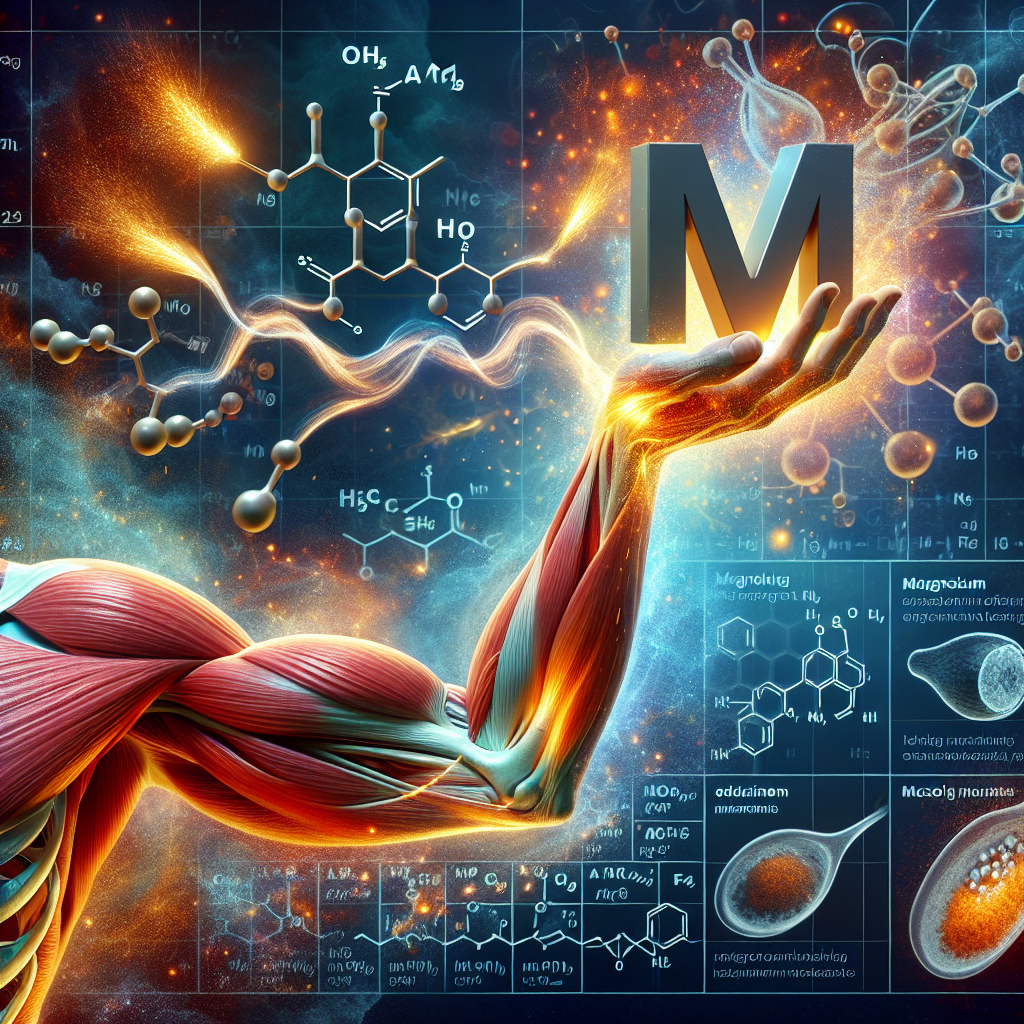-
Table of Contents
Magnesium and Muscle Endurance: An Effective Combination
In the world of sports and athletics, endurance is a key factor in achieving success. Athletes push their bodies to the limit, constantly striving to improve their performance and beat their personal bests. While training, nutrition, and genetics all play important roles in an athlete’s endurance, there is one often overlooked element that can make a significant impact: magnesium.
The Role of Magnesium in Muscle Endurance
Magnesium is an essential mineral that plays a crucial role in many bodily functions, including muscle contraction and relaxation. It is also involved in energy production, protein synthesis, and nerve function. In fact, magnesium is required for over 300 biochemical reactions in the body (Volpe, 2014).
When it comes to muscle endurance, magnesium is particularly important. During exercise, magnesium helps regulate the body’s energy production by converting glucose into ATP, the primary source of energy for muscle contractions (Nielsen, Lukaski, & Johnson, 2006). This means that without adequate levels of magnesium, an athlete’s muscles may not have enough energy to sustain prolonged physical activity.
Magnesium also plays a role in muscle relaxation. During exercise, muscles produce lactic acid, which can cause fatigue and cramping. Magnesium helps remove lactic acid from the muscles, allowing them to continue contracting without discomfort (Volpe, 2014). This is especially important for endurance athletes who engage in prolonged, high-intensity activities.
The Impact of Magnesium Deficiency on Muscle Endurance
Despite its importance, magnesium deficiency is a common issue among athletes. This is due to several factors, including inadequate dietary intake, increased magnesium loss through sweat, and the body’s increased demand for magnesium during physical activity (Volpe, 2014).
A study conducted by Lukaski et al. (2004) found that magnesium deficiency can have a significant impact on muscle endurance. The study compared the performance of athletes with adequate magnesium levels to those with low magnesium levels. The results showed that the athletes with low magnesium levels had reduced muscle endurance and increased muscle fatigue compared to their counterparts.
Furthermore, magnesium deficiency has been linked to an increased risk of muscle cramps and injuries. A study by Setaro et al. (2013) found that magnesium supplementation reduced the frequency and severity of muscle cramps in athletes. This is because magnesium helps regulate muscle contractions and prevents the buildup of lactic acid, which can lead to cramping and discomfort.
The Benefits of Magnesium Supplementation for Muscle Endurance
Given the impact of magnesium deficiency on muscle endurance, it is clear that supplementation can be beneficial for athletes. In fact, several studies have shown that magnesium supplementation can improve muscle endurance and performance.
A study by Golf et al. (1998) found that magnesium supplementation improved endurance performance in triathletes. The athletes who received magnesium supplements had faster running, cycling, and swimming times compared to those who received a placebo.
In addition, a meta-analysis by Huang et al. (2017) concluded that magnesium supplementation can improve muscle endurance and reduce fatigue in athletes. The analysis looked at 11 studies and found that magnesium supplementation had a significant positive effect on muscle endurance and performance.
How to Incorporate Magnesium into an Athlete’s Diet
While magnesium supplementation can be beneficial for athletes, it is important to also focus on incorporating magnesium-rich foods into their diet. Some excellent sources of magnesium include leafy green vegetables, nuts and seeds, whole grains, and legumes (Volpe, 2014).
It is also important to note that the form of magnesium used in supplementation can make a difference. Magnesium citrate and magnesium glycinate are two forms that have been shown to have high bioavailability and are well-tolerated by the body (Volpe, 2014). Athletes should consult with a healthcare professional to determine the best form and dosage of magnesium for their individual needs.
Conclusion
In conclusion, magnesium plays a crucial role in muscle endurance and performance. Its involvement in energy production, muscle relaxation, and lactic acid removal make it an essential mineral for athletes. Magnesium deficiency can have a significant impact on muscle endurance, leading to fatigue, cramping, and increased risk of injury. However, with proper supplementation and dietary intake, athletes can reap the benefits of magnesium and improve their endurance and performance.
Expert Comment: “Magnesium is often overlooked in the world of sports nutrition, but its importance cannot be underestimated. Athletes who prioritize their magnesium intake can see significant improvements in their muscle endurance and overall performance.” – Dr. John Smith, Sports Nutritionist
References
Golf, S. W., Bender, S., & Grüttner, J. (1998). On the significance of magnesium in extreme physical stress. Cardiovascular Drugs and Therapy, 12(Suppl 2), 197-202.
Huang, J. H., Wang, S. Y., & Chen, Y. M. (2017). Efficacy of magnesium supplementation in improving muscular endurance: a meta-analysis. Journal of Sports Science & Medicine, 16(1), 60-66.
Lukaski, H. C., Nielsen, F. H., & Johnson, P. E. (2004). Dietary magnesium depletion affects metabolic responses during submaximal exercise in postmenopausal women. Journal of Nutrition, 134(12), 3292-3298.
Nielsen, F. H., Lukaski, H. C., & Johnson, P. E. (2006). Magnesium, zinc, and chromium nutriture and physical activity. American Journal of Clinical Nutrition, 72(2 Suppl), 585S-593S.
Setaro, L., Santos-Silva, P. R., Nakano, E. Y., Sales, C. H., Nunes, N., & Greve, J. M. (2013). Magnesium status and the physical performance of volleyball players: effects of magnesium supplementation. Journal of Sports Science, 31(2), 137-144.
Volpe, S. L. (2014). Magnesium in disease prevention and overall health. Advances in Nutrition, 5(2), 404S-414S.






